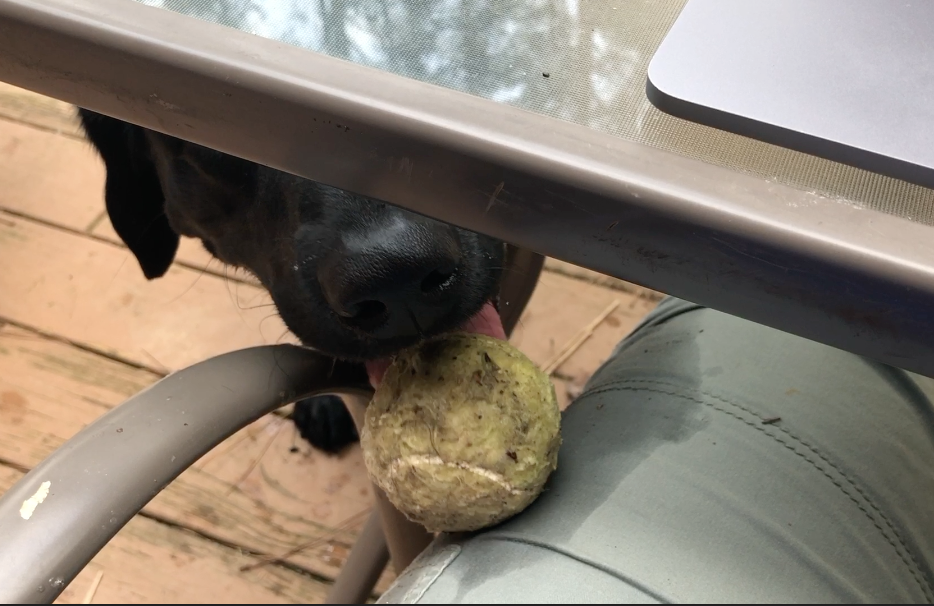3 Ways to Differentiate Persistence from Insanity
Lucille loves to fetch a tennis ball. She could go for HOURS. Our throwing arms – not her stamina – are usually the limiting factors to how long she can fetch.

What Frustration Teaches You
Many life lessons can be gained by responding to frustrations. Here is a quick list of just a few.
- You can gain grit. Grit is a characteristic gained when we persevere. According to the American Psychological Association, determination of your potential for achievement is more correlated with your grit, than your intelligence.
“Grit may be particularly important to accomplishing an especially complex task when there is a strong temptation to give up altogether.”
American Psychological Association
- Frustration can interrupt your routine. While this may not sound like a good thing on the surface, changes in routine can help you discover improvements you might not have considered without that interruption. When your expectation is different from your reality, you can ask why and decide if that is a factor you want to fold into the routine going forward.
- Embracing the “grit to quit.” This was discussed on the Sorta Awesome podcast episode 251 – when to stop. Knowing that you are valuing your own boundaries vs. stubbornly persisting is a lesson in maturity, not failure.
When You Cannot Differentiate Persistence from Insanity
But while there are lessons we can learn from frustrating situations, there can come a time when you cannot differentiate persistence from insanity. Let’s go back to the example of Lucille and her fetching. We have found if she runs for hours like she wants to, the next day she is a slow going down the stairs. Does this happen to you too – persisting too long causing you pain? How can you evaluate when a habit is no longer serving you? When do you know when you have persisted too long and are entering the insanity side of the spectrum?
Here are three ways to differentiate persistence from insanity.
1 – Repetition or Iteration
As mentioned before, insanity has been described as repeating the experience and expecting different results. Call this repetition. But there is also something to be said for learning from your mistakes and trying again with the new data. This is iteration. Trying again with a slightly different plan.
Let’s say that you are trying to establish a plan to eat healthy dinners during the work week. You made this a small, specific goal by choosing to add a side salad to dinner each night. Iteration could look something like this:
Week One – failure on Wednesday because the vegetables you bought Sunday went bad after a couple days.
Adjustment: Plan to grocery shop Wednesday on your way home to get salad ingredients for Wednesday – Friday.
Week Two – failure on Wednesday because you are exhausted mid-week. No WAY are you grocery shopping after work.
Adjustment: Place an online shopping order for pick up at the grocery store on the way home.
Week Three – Success! Side salad consumed with dinner on 4/5 nights. Continue on with this plan.
2 – Value Alignment
I can appreciate hard work. It is certainly as important part of my work ethic. If I am working hard and balancing all of my priorities, then I know it is the right next step for me to continue onward.
This was not the case after I tore my meniscus for the second time. After the first tear, I worked my ass off to rehabilitate it and get back to running. I managed a couple years more of running and did not shy away from the effort of the persistence. Warm ups, cool downs, stretching, strength training all added time I was not running, working or being with my family. It did not alleviate the pain altogether, either. Just managed to make me able to lace up again.
So when I felt the same shredding of the connective tissue later, I had a very frank conversation with my Physical Therapist. If I wanted to walk and hike in my 80’s, I needed to stop running and get the knee fixed surgically. Although hard work is a priority, rehabbing to return to running no longer aligned with my core values – to be physically active throughout my lifetime.
To continue to run would have been insanity, not persistence.
3 – Know Your Why
In order to know your why, you need to have a frank discussion with yourself. Are you persisting for the right reason? This is important with habit change because you need to be making changes for yourself, not for other people. Habit change is more likely to stick if it comes from intrinsic motivation – motivation from within. Here are the worst two answers to why you are persisting.
Continuing out of fear. Do you continue going to work in a stressful job you hate because you fear what might happen if you don’t have your fancy title and office? Are you fearful what your partner would say if you announced you want to start martial arts classes?
People pleasing. Are you only losing weight because your mother still makes comments 10 years after you had your first baby? Maybe you don’t really want to go to happy hour every Thursday with your friends, but you don’t want them to not like you. Let me ask you this: If you are so busy pleasing people, where are all the pleased people?
Answering yes to fear and people pleasing being your why is a red flag. Dig deeper. If you cannot find an answer that serves you, maybe it is time to consider a change.